|
|
|
Sort Order |
|
|
|
Items / Page
|
|
|
|
|
|
|
| Srl | Item |
| 1 |
ID:
156781
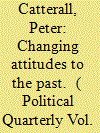

|
|
|
|
|
| Summary/Abstract |
What societies choose to remember about the Past can pose challenges for professional gatekeepers in museums, archives and statutory bodies charged with managing national heritage. Recent examples examined in this article include the inauguration of the National Museum of African American History and Culture in Washington, the 2016 Capability Brown Festival, changing attitudes towards poppies and the Rhodes Must Fall movement. These are explored through establishing a taxonomy of the eight functions that lieux de mémoire fulfil in the course of reflecting the Past to the Present. Drawing attention to the way in which the imperialism of the Past is buried beneath the pristine lawns of Capability Brown's gardens in the Present, this article concludes by warning that lieux de mémoire can provide an aesthetic veneer, glossing over aspects of the Past that societies, or elites within those societies, would, for their own purposes, rather forget.
|
|
|
|
|
|
|
|
|
|
|
|
|
|
|
|
| 2 |
ID:
156785
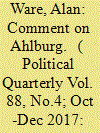

|
|
|
|
|
| Summary/Abstract |
At the heart of my article in 2015, to which Dennis A. Ahlburg is publishing a rejoinder, lay reports and official data exposing a major flaw in British education policy. The data show that, even five years after graduation, about one third of all graduates this century have not been employed in jobs for which a university degree was actually required. Furthermore, projections for student loan repayments indicate that well over one third of the total will never be repaid; since repayment is triggered only when someone's income reaches a level similar to the average for part-time employees (and less than for full-time workers), massive social waste seems apparent.1 This scale of waste is partly due to traditionally high costs of university level teaching when compared with many forms of teaching and methods for developing skills. (Primarily this is because effective teaching at an advanced level, especially of analytic skills, is best undertaken in small groups, and also because it requires close co-ordination with those researching in the relevant fields.) Eventually someone has to pay for that education. In the much smaller higher education sector of the mid-twentieth century the cost was largely borne by the British state. Later a large portion was transferred to students themselves, through introducing tuition fees and abolishing universal maintenance grants, and also to future tax payers when loans are not repaid. From the sole perspective of financial return (my focus in that article), more seems to be being paid by individuals and the state than necessary for servicing the needs of the British labour market.
|
|
|
|
|
|
|
|
|
|
|
|
|
|
|
|
| 3 |
ID:
156782
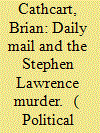

|
|
|
|
|
| Summary/Abstract |
The Daily Mail's coverage of the 1993 race murder of Stephen Lawrence has been held up as an example of newspaper journalism at its best. It is a cause of pride to the paper, which has asserted that its 1997 front page accusing five men of the murder, and the comment and reporting that followed, brought about significant social and policy changes and helped achieve justice. The coverage has also been cited by the paper to rebut critics who accuse it of intolerance. Examined in detail here and set in their context, the paper's claims about its role in the case prove to be either exaggerated or not supported by evidence. The Mail's engagement in the Lawrence case involved a famous instance of editorial brilliance, but insofar as its campaign brought about or contributed to changes, they were not usually changes sought by the paper and they were sometimes contrary to its aims.
|
|
|
|
|
|
|
|
|
|
|
|
|
|
|
|
| 4 |
ID:
156774


|
|
|
|
|
| Summary/Abstract |
Historian, activist and campaigner Edward Thompson is seen as an exemplar of an English radicalism which some see as a lineage with which the contemporary Labour party might fruitfully reconnect. This article examines how Thompson himself understood and characterised the ‘English radical idiom’ and traces his use and then abandonment of this idea in the middle years of his career. It offers some wider reflections about what the insights and lessons associated with his historical writings and reflections on the distinctive nature of English cultural and social thought.
|
|
|
|
|
|
|
|
|
|
|
|
|
|
|
|
| 5 |
ID:
156776
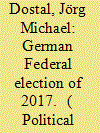

|
|
|
|
|
| Summary/Abstract |
The 2017 German federal election delivered dramatic electoral decline of the two traditional main parties, the Christian Democrats (CDU/CSU) and the Social Democratic Party (SPD), who had governed Germany in a ‘grand coalition’ government since 2013. The main reason for this outcome was the decision by Chancellor Angela Merkel to open Germany's borders for refugees and migrants, an unprecedented policy that abandoned border controls and remained in place between September 2015 and March 2016. This article focuses on how the refugee and migration problem subsequently turned into a wedge issue, splitting most German political parties and handing a major election victory to the main critics of Merkel's decision, namely the rightist Alternative for Germany (AfD) and the right-wing liberals of the Free Democratic Party (FDP). Rather than explaining these developments in isolation, the article highlights how past welfare state retrenchment and fear over future economic prosperity make significant groups of the electorate, including former supporters of left-of-centre parties, lose confidence in the ability of the political system to deliver stability and social integration.
|
|
|
|
|
|
|
|
|
|
|
|
|
|
|
|
| 6 |
ID:
156779


|
|
|
|
|
| Summary/Abstract |
Public policy for supporting the visual arts has historically followed different traditions in France and the United Kingdom. In an environment of fiscal austerity that impacts upon public funding as well as private patronage, and given the tensions between artistic freedom on the one hand, and market constraints on the other, this article examines how these two traditions of financing artists has influenced the direction of the work itself. A brief historical presentation of the two forms of public support and their evolution in recent decades provides a framework for understanding government attitudes and policies on both sides of the Channel. A closer examination of selected artists, chosen here for their representativeness and their international renown, is used to illustrate the changing nature of public support for visual art creation.
|
|
|
|
|
|
|
|
|
|
|
|
|
|
|
|
| 7 |
ID:
156784
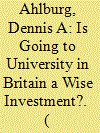

|
|
|
|
|
| Summary/Abstract |
In his recent article in this journal, Alan Ware claimed that for most students higher education was not worth the cost.1 The following evaluates Ware's claim in the context of similar scepticism having been expressed in the media in the UK, the US, and elsewhere. It is argued that this view, and many of the conclusions drawn, is inconsistent with the available empirical evidence on the value of higher education. If students reject higher education because of such views they—and society—will underinvest in higher education.
|
|
|
|
|
|
|
|
|
|
|
|
|
|
|
|
| 8 |
ID:
156794


|
|
|
|
|
| Summary/Abstract |
Writing in mid-2017, it is very hard for anyone to pretend that class is not a major factor in British politics. After a major financial crisis and the deepest recession since the 1930s, with household incomes stagnating and inequality growing between class, generation and region, we seem a world away from a time when anyone felt able to say ‘we are all middle class now’. In many ways, this reinforces the arguments made by Geoffrey Evans and James Tilley in The New Politics of Class, which is a welcome, thorough and provocative examination of the enduring impact of class on British politics. It is clear that class is still a central determining factor in our politics, that new and old gulfs between sections of our society are widening, and that working class voters in ex-industrial communities are now seen as up-for-grabs, and one of the key constituencies to determine any election. As the writer Jonathan Rutherford noted, the Brexit vote, ‘for the first time since 1945, [gave] the economic losers a democratic victory over the economic winners’.1
|
|
|
|
|
|
|
|
|
|
|
|
|
|
|
|
| 9 |
ID:
156786
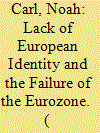

|
|
|
|
|
| Summary/Abstract |
Since late 2007, the Eurozone has been embroiled in a crisis that has seen GDP per capita stagnate, public debt soar, and unemployment reach record levels. This article argues that the Eurozone crisis will inevitably force fundamental changes in the structure of the EU. The only way to make the Eurozone work is through deeper fiscal integration of Eurozone economies. Yet wholesale fiscal integration cannot be achieved in the near term, due to the fact that EU citizens continue to identify more with their own nationalities than with Europe as a whole. The Eurozone economies of southern Europe will, therefore, continue to flounder, leading to further anti-EU sentiment. Anti-EU sentiment may eventually increase up to the point where one or all of these countries leave the Eurozone or the EU altogether. These propositions are supported with arguments from economic theory, and are bolstered by evidence from surveys and opinion polls.
|
|
|
|
|
|
|
|
|
|
|
|
|
|
|
|
| 10 |
ID:
156787
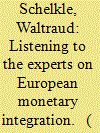

|
|
|
|
|
| Summary/Abstract |
Noah carl's article is a fairly representative contribution to the distinctive genre of ‘European dystopias’. His eurozone is a dystopia in the precise sense of the Oxford Dictionary: ‘An imagined place or state in which everything is unpleasant or bad, typically a totalitarian or environmentally degraded one.’ The fevered imaginations are usually those of US economists; the source of their bleak predictions is the economic theory of optimal currency areas. Carl extends the economic analysis to the realm of identity politics, and enlists a few more authors that inspired his own dystopia, among them that well-known scholar of all things monetary and European, Mrs ‘I-want-my-money-back’ Thatcher.
|
|
|
|
|
|
|
|
|
|
|
|
|
|
|
|
| 11 |
ID:
156790
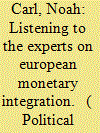

|
|
|
|
|
| Summary/Abstract |
I would like to thank Dr Schelkle for writing an interesting and instructive comment on my article. While there is much to agree with in her comment, there are also a number of points that I wish to contest. I will take these points in turn.
|
|
|
|
|
|
|
|
|
|
|
|
|
|
|
|
| 12 |
ID:
156796


|
|
|
|
|
| Summary/Abstract |
The first thing to do is, of course, thank the four authors for all of their thoughts on the New Politics of Class (from now on NPC). In this response, we want to both address some of the issues that they raise, but also reflect a little on our findings and conclusion in the light of the 2017 general election. Before doing either of these, it is perhaps worth setting out the main argument of the book, which focuses on three main claims about British politics since 1945. First, ideological divisions among people due to occupational class and education have been fairly constant over the last seventy years. Second, parties have changed, and this change was a one-off shock to the system in the 1990s with the emergence of New Labour. And third, this combination of voter continuity and party change resulted in a large decline in class voting for the main parties in the 1990s and a delayed, but equally large, increase in class non-voting in the 2000s.
|
|
|
|
|
|
|
|
|
|
|
|
|
|
|
|
| 13 |
ID:
156792
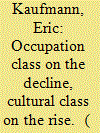

|
|
|
|
|
| Summary/Abstract |
In The New Politics of Class (NPC), Geoffrey Evans and James Tilley lay out a comprehensive new sociology and politics of class in Britain based on detailed empirical analysis of the foremost social surveys in the country. A strength of the book is that it provides a one-stop reference guide to social and political trends concerning class since surveys began in the 1960s. This is outlined in some fifty handy and well-crafted figures. For this reason alone, the book should be required reading for students of British politics.
|
|
|
|
|
|
|
|
|
|
|
|
|
|
|
|
| 14 |
ID:
156795
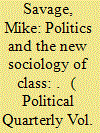

|
|
|
|
|
| Summary/Abstract |
Forty years ago, proponents of the ‘class dealignment’ thesis—such as Ivor Crewe and his collaborators—began to diagnose the declining salience of class in affecting electoral outcomes in the UK. Throughout the 1980s and into the 1990s, sociologists resisted this claim by insisting that if a rigorous model of class was used, and that if relative rather than absolute differences were examined, there was no decline, but only ‘trendless fluctuation’ in the class–vote relationship. A key intervention here was the adoption of John Goldthorpe's class schema, which distinguished between classes according to employment relationships, rather than a crude divide between manual and non-manual workers. Goldthorpe's approach proved much more discriminating, for instance in highlighting how business owners were more prone to support the Conservative party, and his thinking led to the National Statistic Socio-Economic Classification (NS-SEC) which was adopted by the Office of National Statistics.
|
|
|
|
|
|
|
|
|
|
|
|
|
|
|
|
| 15 |
ID:
156778


|
|
|
|
|
| Summary/Abstract |
Donald Trump's election as president certainly startled many, though not all political observers. In this article, I offer my own observation that Mr Trump's election represents a developmental progression of America's electoral system from a political process to an entertainment process. The effect of the office of the president now is to distract and entertain. I will aim to convince readers that his election as America's president is not an anomaly, but rather represents how the politics of image and representation now work as an everyday event and should be treated as part of a reality that we should now take for granted.
|
|
|
|
|
|
|
|
|
|
|
|
|
|
|
|
| 16 |
ID:
156773


|
|
|
|
|
| Summary/Abstract |
This article explores the recent rise of populist politics from the perspective of Karl Polanyi's theory of the ‘double movement’. It firstly introduces Polanyi's understanding of interwar populism, and relates this to his broader critique of liberal economic thought. This framework is then used to analyse three prominent explanations for populism which emerged in the wake of the UK's 2016 EU referendum: globalisation; cultural reaction; and social media. I show how each of these explanations exogenises contemporary populist movements, narrating them as something external to the liberal economic restructuring pursued globally since the 1980s. Failing to diagnose adequately the causes of contemporary populist movements, which lie in this utopian attempt to treat labour as a commodity, they cannot support an intellectually coherent progressive response to Brexit. Finally, I outline a political agenda centred on labour de-commodification, which could directly address populist grievances and reclaim the discourse of ‘taking back control’ for the left.
|
|
|
|
|
|
|
|
|
|
|
|
|
|
|
|
| 17 |
ID:
156783


|
|
|
|
|
| Summary/Abstract |
In December 2016, the British Government banned National Action for being an extremist organisation. It was the first time in British history that membership of a far-right group was outlawed. While so, little is known about the group. This article responds to this lack of knowledge by setting out the origins of National Action and its leaders, its preference for a traditionalist Nazi ideology, and its penchant for stunts and demonstrations to gain media attention and publicity. The article concludes by considering whether proscription was rather more symbolic than serious.
|
|
|
|
|
|
|
|
|
|
|
|
|
|
|
|
| 18 |
ID:
156797


|
|
|
|
|
| Summary/Abstract |
IN MARCH 2017, shortly before the sixtieth anniversary of the signing of the Treaty of Rome, a White Paper was published which reflected on the challenges countries face and which sought to chart a course for the EU27 to 2025 (and beyond).1 In his introduction to the White Paper, Jean-Claude Juncker argued ‘As we decide which way to go, we should remember that Europe has always been at its best when we are united, bold and confident that we can shape our future together.’ The White Paper set out five illustrative ‘ways to go’, ranging from doing less, carrying on as now, letting some countries go further, through to the EU27 doing more together.
|
|
|
|
|
|
|
|
|
|
|
|
|
|
|
|
| 19 |
ID:
156772
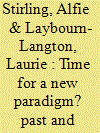

|
|
|
|
|
| Summary/Abstract |
This article seeks to place the UK's present economic ‘moment’ in historical context. Over the course of the decade since the 2007 financial crisis, it has increasingly been acknowledged that a cyclical crisis has become a structural crisis. The failure of most economists to predict the financial crash in the first place, and the inadequacy of economic policy in responding to its lasting effects, has led many to conclude that economics itself is in crisis. This article seeks to contribute to a better understanding of the present period of disjuncture. Drawing on theories of paradigm shift from both the physical and social sciences, we argue that the speed of change in UK economic policy is comparable to the two major historical transitions that ended with the post-war consensus and neoliberalism. We conclude by offering some remarks on how and where the present change might take us.
|
|
|
|
|
|
|
|
|
|
|
|
|
|
|
|
| 20 |
ID:
156791
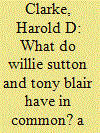

|
|
|
|
|
| Summary/Abstract |
The New Politics of Class by Geoffrey Evans and James Tilley is a new and noteworthy contribution to the huge literature on the impact of social class on voting and elections in Great Britain. For anyone interested in British party politics, the book makes interesting reading. The New Politics of Class (hereafter NPC) presents a challenging argument about the evolution of class politics in Britain over the past half-century. Evans and Tilley's analyses and interpretations raise a large number of controversial issues that deserve careful consideration by experts in the field. Well organised and clearly written, the book will appeal to a broad audience of social scientists, journalists, students and interested laypersons. Relying heavily on simple graphs to present supporting quantitative evidence, NPC is readily accessible to anyone lacking technical training in sophisticated statistical methods.
|
|
|
|
|
|
|
|
|
|
|
|
|
|
|
|
|
|
|
|
|